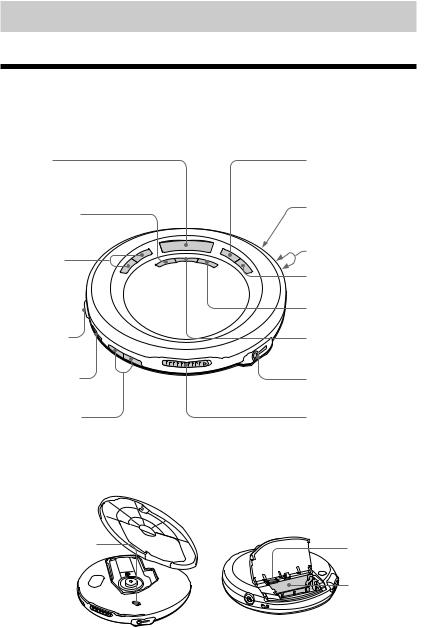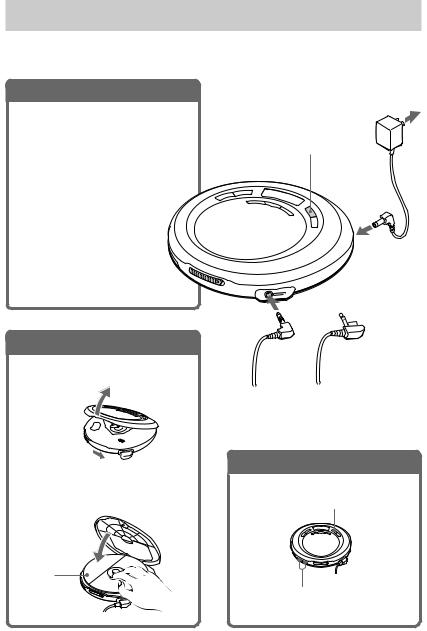Sony D-E666, D-EJ620, D-EJ623 User Manual

3-225-006-23 (1)
Portable
CD Player
Operating Instructions
About the area code
The area code of the location in which you purchased the CD player is shown on upper left of the bar code label on the package.
For accessories supplied with your CD player, check the area code of your model and see “Accessories (supplied/optional).”
D-E666
D-EJ620
D-EJ621
D-EJ623
D-EJ625
© 2000 Sony Corporation

CAUTION
The use of optical instruments with this product will increase eye hazard.
Certain countries may regulate disposal of the battery used to power this product. Please consult with your local authority.
For the customers in Australia
The supply cord of the AC power adaptor cannot be replaced; if the cord is damaged, the AC power adaptor should be discarded.
For the customers in the USA and Canada
This mark is available in the USA and Canada only
RECYCLING NICKEL-CADMIUM BATTERIES
Nickel-Cadmium batteries are recyclable. You can help preserve our environment by returning your unwanted batteries to your nearest point for
collection, recycling or proper disposal.
Note: In some areas the disposal of nickel-cadmium batteries in household
or business trash may be prohibited.
RBRC (Rechargeable Battery Recycling Corporation) advises you about spent
battery collection by the following phone number.
Call toll free number: 1-800-822-8837 (United States and Canada only)
Caution: Do not handle damaged or leaking nickelcadmium batteries.
For the customers in the USA and Canada
DISPOSAL OF NICKEL METAL HYDRIDE BATTERY.
NICKEL METAL HYDRIDE BATTERY. DISPOSE OF PROPERLY.
You can return your unwanted nickel metal hydride batteries to your nearest Sony Service Center or Factory Service Center.
Note: In some areas the disposal of nickel metal hydride batteries in household or business trash may be prohibited.
For the Sony Service Center nearest you call 1-800- 222-SONY (United States only)
For the Sony Factory Service Center nearest you call 416-499-SONY (Canada only)
Caution: Do not handle damaged or leaking nickel metal hydride battery.
2

Table of Contents |
|
Getting started |
|
Locating the controls ................................... |
4 |
Playing a CD |
|
1. Connect your CD player. ......................... |
6 |
2. Insert a CD. ............................................. |
6 |
3. Play a CD. ............................................... |
6 |
Playback options |
|
Playing tracks repeatedly (Repeat play) ...... |
9 |
Playing a single track (Single play) ............. |
9 |
Playing tracks in random order |
|
(Shuffle play) .......................................... |
9 |
Playing tracks in your favorite order |
|
(PGM play) ............................................ |
10 |
Available features |
|
G-PROTECTION function ........................ |
11 |
Emphasizing the bass sound (SOUND) .... |
11 |
Protecting your hearing (AVLS) ................ |
12 |
Locking the controls (HOLD) ................... |
12 |
Turning off the operation beep sound ........ |
13 |
Connecting your CD player |
|
Connecting a stereo system ....................... |
14 |
Connecting a power source |
|
Using the rechargeable batteries ................ |
15 |
Using the dry batteries ............................... |
17 |
Notes on the power source ........................ |
17 |
Additional information |
|
Precautions ................................................ |
18 |
Maintenance .............................................. |
18 |
Troubleshooting ......................................... |
19 |
Specifications ............................................ |
21 |
Accessories (supplied/optional) ................ |
22 |
3

Getting started
Locating the controls
For details, see pages in parentheses.
CD player (front)
1Display
(pages 7, 9 - 12)
2PLAY MODE button
(pages 8 - 10)
3 ./>
(AMS/search) buttons
(pages 7, 9, 10)
4 LINE OUT jack (page 14)
5HOLD switch (page 12)
6VOLUME +/– buttons
(page 6)
CD player (inside)
qg G-PROTECTION switch
(page 11)
7 u(play/pause) button
(pages 6, 7, 10)
8DC IN 4.5 V (external power input) jack (pages 6, 15)
9 Strap holes (page 5)
q; x(stop)/CHG (charge) button (pages 7, 13, 15)
qa SOUND button (page 11)
qs REPEAT/ENTER button (pages 8 - 10)
qd i (headphones) jack (page 6)
qf OPEN switch (page 6)
CD player (rear)
qh AVLS switch (page 12)
qj Battery compartment (page 15)
4

Remote control (for the models supplied with the remote control)
qk x(stop) button |
w;N(play)•> |
(pages 7, 13) |
(AMS/search) button |
|
(pages 6, 7, 9, 10) |
ql VOL (volume) |
wa HOLD switch |
+/– button |
(page 12) |
(page 6) |
|
|
ws .(AMS/search) |
|
button |
|
(pages 7, 9, 10) |
Note
Use only the supplied remote control. You cannot operate this CD player with the remote control supplied with other CD players.
started Getting
Using the hand strap (for the models supplied with the hand strap)
To carry during strenuous activity, use the supplied hand strap.
1 Pass the hand strap through the strap holes of the player.
2Put your hand through the hand strap, and hold the player in one of two ways as illustrated below.
5

Playing a CD
You can also use rechargeable batteries and dry batteries as a power source.
1. Connect your CD player.
1Connect the AC power adaptor.
2Connect the headphones/earphones.
For models supplied with the AC plug adaptor
If the AC power adaptor does not fit the AC outlet, use the AC plug adaptor.
For models supplied with the remote control
•Connect the plug of the headphones/ earphones to the remote control.
•Connect the headphones/earphones to the remote control firmly. A loose connection may cause noise during playback.
2. Insert a CD.
1Slide OPEN to open the lid.
OPEN 

 switch
switch 
2Place the CD on the tray and close the lid.
Label side up
to an AC outlet
u button
AC power adaptor
to DC IN 4.5V
to i (headphones) |
or |
Headphones or Earphones
3. Play a CD.
Press u.
Adjust the volume by pressing VOLUME + or –.
6

To |
Press |
Play/Pause |
u |
|
|
Stop |
x/CHG*2 |
Find the beginning of the current track (AMS*1) |
.once quickly*2 |
Find the beginning of the previous tracks (AMS) |
.repeatedly*2 |
Find the beginning of the next track (AMS) |
>once quickly*2 |
Find the beginning of the succeeding tracks (AMS) |
>repeatedly*2 |
Go backwards quickly |
Hold down .*2 |
Go forward quickly |
Hold down >*2 |
*1 Automatic Music Sensor
*2 These operations can be done during both play and pause.
About the display
•When you press u(Nfor the remote control) after changing the CD or turning off and on the player, the total number of tracks in the CD and total playing time appear for about two seconds.
•During play, the track number and the elapsed playing time of the current track appear.
•During pause, the elapsed playing time flashes.
If the volume level does not increase
•Is AVLS set to “LIMIT”? Set AVLS to “NORM.” For details, see “Protecting your hearing (AVLS).”
•Are the headphones/earphones connected to the LINE OUT jack? Connect them to the i (headphones) jack.
Removing the CD
Remove the CD while pressing the pivot in the center of the tray.
a Playing
CD
7

Playback options
You can enjoy various ways of playback using PLAY MODE and REPEAT/ENTER.
PLAY MODE button
Each time you press the button, you can change the playback mode.
No indication (Normal play)
“1”
(Play a single track)
“SHUF”
(Play tracks in random order)
“PGM”
(Play tracks in your favorite order)
./> buttons
REPEAT/ENTER button
REPEAT
You can repeat play that is selected using PLAY MODE.
ENTER
You can select tracks for PGM play mode.
ubutton
x/CHG button
8
